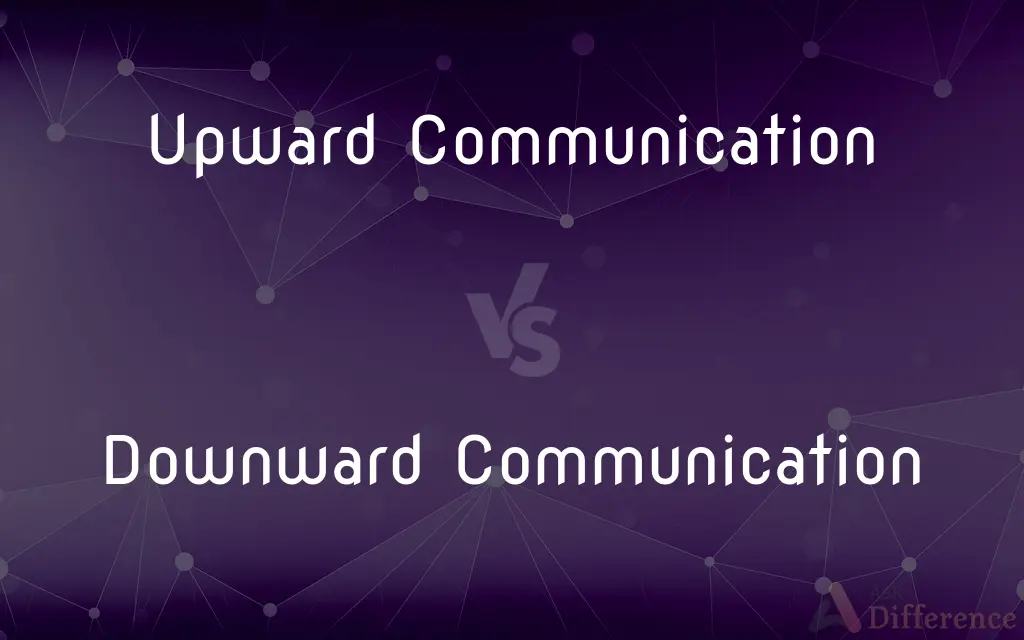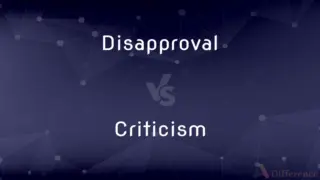Upward Communication vs. Downward Communication — What's the Difference?
By Tayyaba Rehman — Published on October 19, 2023
Upward Communication involves messages moving from subordinates to superiors, while Downward Communication flows from superiors to subordinates in an organizational hierarchy.

Difference Between Upward Communication and Downward Communication
Table of Contents
ADVERTISEMENT
Key Differences
Upward Communication relates to the flow of information from lower-level employees to higher-level individuals within an organization. It is generally employed to share feedback, suggestions, or grievances with higher management. Upward Communication can foster an environment that empowers employees, giving them a voice and the ability to share insights and concerns.
Contrastingly, Downward Communication pertains to the transmission of information from individuals at a higher organizational level to those at lower levels. This type of communication is instrumental in providing instructions, policies, and information to guide subordinates in their work. Downward Communication helps streamline operations by establishing clear expectations and directives.
While Upward Communication is pivotal for management to understand employee needs, morale, and to receive feedback, it sometimes can be hampered by barriers like fear of reprisal or miscommunication. Upward Communication necessitates an open organizational culture to function optimally and to support employee engagement.
On the other hand, Downward Communication is essential for maintaining organizational consistency and ensuring all members understand their roles, responsibilities, and the expectations placed upon them. However, Downward Communication can be hindered by issues such as distorted message transmission and can sometimes be perceived as authoritative if not managed correctly.
Effective Upward Communication aids organizations in making informed decisions by utilizing input from various organizational levels, ensuring diverse perspectives are considered. It demonstrates to employees that their input is valued, fostering a positive organizational culture.
ADVERTISEMENT
In contrast, efficient Downward Communication ensures that organizational objectives, expectations, and procedural updates are clearly and consistently communicated to all relevant parties. It plays a crucial role in ensuring that the strategic direction of the management team is understood and implemented accurately throughout the organization.
Comparison Chart
Flow Direction
From lower to higher organizational levels
From higher to lower organizational levels
Primary Purpose
To provide feedback, suggestions, and grievances to superiors
To provide instructions, policies, and guidance to subordinates
Importance
Empowers employees and promotes a feedback culture
Ensures clarity and consistency in organizational operations
Potential Barriers
Fear of reprisal, miscommunication
Distorted message transmission, perception as authoritarian
Organizational Impact
Influences management decisions and strategy
Implements and reinforces management decisions and strategy
Compare with Definitions
Upward Communication
Feedback or data sharing from subordinates to superiors.
Through Upward Communication, the management learned about team challenges.
Downward Communication
Transmitting information from superiors to subordinates.
Downward Communication was used to convey the new operational procedures.
Upward Communication
Employee-initiated communication directed to higher management.
Upward Communication was encouraged for fostering an open work environment.
Downward Communication
Sharing of organizational goals and policies from leaders to team members.
Effective Downward Communication clarified the company’s new direction to all employees.
Upward Communication
Transmitting information or concerns to higher organizational levels.
Upward Communication platforms were introduced to enhance employee voice.
Downward Communication
Flow of directives and policies from top to bottom in an organization.
Downward Communication ensured uniformity in implementing the new strategy.
Upward Communication
Communicating messages from lower to higher hierarchy levels.
Employees utilized Upward Communication to share feedback on the new policy.
Downward Communication
Communication originating from management aimed at employees.
Through Downward Communication, the new policies were introduced to the staff.
Upward Communication
A communication flow from non-managerial to managerial positions.
Her Upward Communication was crucial in identifying operational bottlenecks.
Downward Communication
Messages from higher hierarchy levels directed to lower levels.
The CEO utilized Downward Communication to share the annual goals.
Common Curiosities
What is Upward Communication?
Upward Communication involves messages moving from lower organizational levels to higher ones, often sharing feedback or concerns.
Why is Upward Communication crucial?
Upward Communication is vital for sharing employee feedback, suggestions, and grievances with higher management, impacting decision-making.
Can Upward Communication influence organizational strategy?
Yes, Upward Communication can influence strategy by providing management with valuable insights and feedback from ground-level employees.
What role does Downward Communication play in organizations?
Downward Communication helps transmit directives, policies, and important information from superiors to subordinates.
What defines Downward Communication?
Downward Communication flows from higher to lower organizational levels, typically sharing directives or information.
What is the significance of effective Downward Communication?
Effective Downward Communication ensures clear, consistent transmission of organizational objectives and expectations to all staff levels.
What barriers may Upward Communication face?
Upward Communication can face barriers like fear of reprisal, hierarchical deterrents, and potential miscommunication.
Share Your Discovery

Previous Comparison
Disapproval vs. Criticism
Next Comparison
Magnesium Oxide vs. Magnesium GlycinateAuthor Spotlight
Written by
Tayyaba RehmanTayyaba Rehman is a distinguished writer, currently serving as a primary contributor to askdifference.com. As a researcher in semantics and etymology, Tayyaba's passion for the complexity of languages and their distinctions has found a perfect home on the platform. Tayyaba delves into the intricacies of language, distinguishing between commonly confused words and phrases, thereby providing clarity for readers worldwide.














































